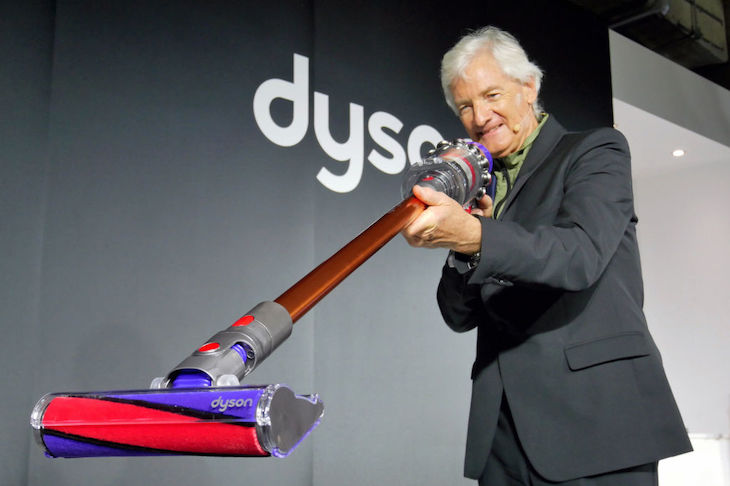As tax rates rise in the UK, so do business jitters. The windfall tax on oil and gas companies – raising tax on profits to 75 per cent this year – has energy companies openly discussing plans to divert money elsewhere. The looming hike in corporation tax – from 19 per cent to 25 per cent for the largest companies – also has the businesses talking about future investment strategies.
So far, Chancellor Jeremy Hunt seems unconvinced that investment threats will amount to much. His Budget next week is expected to confirm the corporation tax rise in April. But the backlash is growing: from MPs in his own party who are worried about the economic ramifications of raising tax as the economy teeters on the edge of recession, to business leaders who fear the UK is becoming less business friendly.
Today saw one of the biggest interventions yet as James Dyson issued a stark warning to Hunt. The billionaire entrepreneur insisted that the Chancellor’s pursuit of higher corporation tax both domestically and abroad will lead to less business investment and a weaker economy. His comments, first reported by the Sun, come in the form of a letter – the second one written to the Treasury ahead of the Budget – flagging the serious ramifications of the six percentage point increase to corporation tax, as well as the UK’s pursuit of a global minimum corporation tax.
Dyson’s comments about investment strategy are likely to catch the eye of No. 10
Dyson’s letter is detailed and highly pessimistic. It forecasts that any additional tax revenue raised globally through a minimum standard for corporation tax will be ‘offset by the economic drag of businesses being forced to invest in compliance, rather than activities which generate growth or improve productivity.’ He brings up ethical questions about the UK’s position, too, which is already under scrutiny as Britain plays an active role in trying to force other countries to forgo their competitiveness and raise their taxes. It’s a ‘deeply ironic’ move, Dyson says, ‘after the country has just fought to rid itself of another unelected body, the EU.’
But the biggest revelation in the letter is Dyson’s suggestion that these hikes in tax are going to have a direct impact on his company’s investment and jobs strategy. The combination of the corporation tax hike to 25 per cent, alongside the global minimum tax, will lead, according to the letter, to ‘an even greater tax burden on companies like Dyson’. Dyson warns that this will ultimately result in less investment in the UK. In reference to the £1.4 billion spent by his firm on research and development (R&D) in recent years – and the 3,500 people the company employs across the UK – Dyson asserts that the Chancellor ‘can be sure that all those numbers will reduce as a result of this measure’ – though he does not specify to what extend investment and employment could be reduced.
There’s good reason to believe Hunt might be sympathetic to Dyson’s letters: after all, the Chancellor ran two leadership elections, in 2019 and 2022, calling for cuts to corporation tax (12.5 per cent and 15 per cent respectively). But the tax hikes he is set to oversee are the pet project of the Prime Minister. Not only did Rishi Sunak announce these corporation tax hikes in March 2021; he did so with a genuine belief that higher rates will raise more revenue with limited market distortion. Furthermore, he did indeed help ‘lead the charge’, as Dyson claims, to bring in a global levy. And there is no sign that Hunt wants to have these tax battles with Sunak.
Despite the track record of the 2010s – when corporation tax rates fell and revenue rose – Sunak has never been convinced that it was the lower tax rate that yielded these results. He’s much more interested in business investment, which is why he introduced the super deduction for companies at the same time as the corporation tax announcement, and why he designed the windfall taxes to include an ‘investment allowance’ allowing for a 91p tax saving for every pound invested.
The government’s justification for any uplift in corporation tax will remain the same: that the UK’s covid spending, leading to record-high deficits, requires more cash to fill in the gaps. But ministers know that this tax hike gamble will be fairly easily proven – or disproven – by the data within a matter of years. So Dyson’s comments about investment strategy are likely to catch the eye of No. 10; those in Downing Street will be watching closely to see if the company does indeed reduce its R&D spending, or cut jobs.
But the battle over corporation tax is likely to ramp up further in the coming months. Dyson’s letter echoes the broad sentiment of free enterprise supporters who claim that this is ‘another tax grab by governments on the basis that they know better than the private sector how to create wealth.’ It’s not a sentiment Sunak would disagree with generally – yet his policies on corporation tax make it increasingly difficult for the Prime Minister to make that case.







Comments